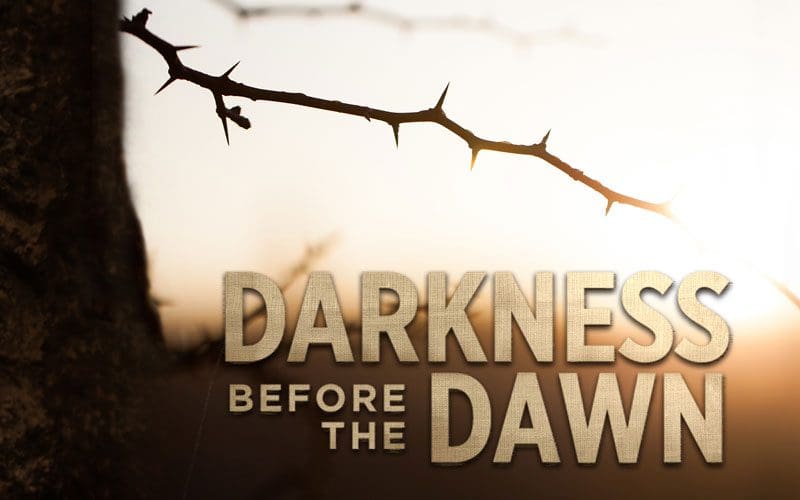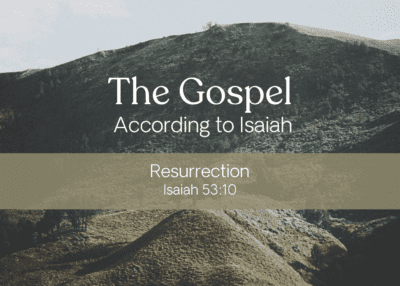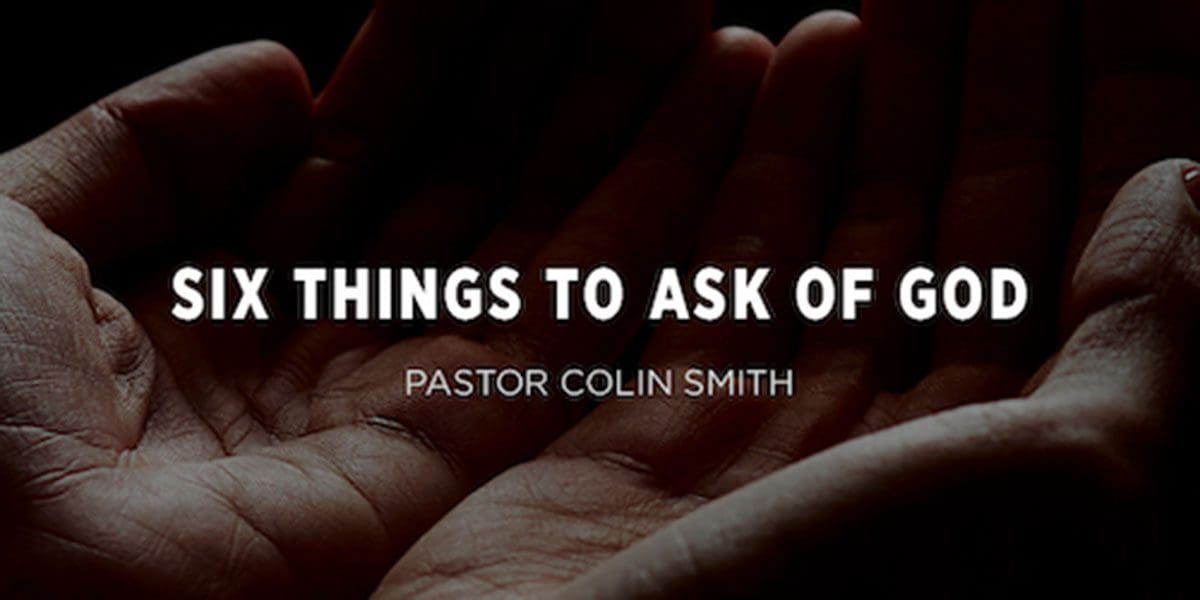Then Jesus went with them to a place called Gethsemane, and he said to his disciples, “Sit here, while I go over there and pray.” (Matthew 26:36)
Easter is just three weeks away, and at this time of year we look again at the center of our Christian faith: All that Jesus accomplished for us in his death and resurrection.
This year our Easter series is titled: “Darkness Before the Dawn.” We are going to look together at what happened on the night before our Lord Jesus was crucified.
What an extraordinary night that was! It began with the Lord’s Supper. Then Jesus went to the Garden of Gethsemane where he prayed.
Then Judas arrived with a mob, armed with swords and clubs. Jesus was arrested and he was bound. Then a series of trials followed in which our Lord was taken to Annas, then Caiaphas, then Pilate, then Herod, and then back to Pilate again.
Our Lord was crucified at 9 o’clock in the morning. So these trials must all have taken place during the hours of darkness, either late at night or in the early hours of the morning.
In the Garden of Gethsemane, Jesus said to those who arrested him: “This is your hour when darkness reigns” (Luke 22:53, NIV). The dawn would come at the resurrection of Jesus Christ on Easter morning, but the night when Jesus was betrayed, arrested, scourged, and condemned was the darkness before the dawn.
We are going to look at three scenes from that night and we begin today with the Garden of Gethsemane and the prayer of Jesus.
Please turn in your Bible to Matthew 26.
The Emotional Life of Jesus
Anyone who speaks of these verses must feel, as I do, a sense of awe and wonder at what is before us today. Here we are given a unique glimpse into the emotional life of our Lord, into what he endured, into what it took for him to become the savior he is.
“Then Jesus went with them [the eleven disciples], to a place called Gethsemane, and he said to his disciples, ‘Sit here, while I go over there and pray’” (Mat. 26:36).
We know from the Gospels that Jesus gave himself to prayer, especially at key moments in his ministry, and here as he enters his passion, he gives himself to prayer.
“And taking with him Peter and the two sons of Zebedee…” (Mat. 26:37). Peter, James and John were the inner circle around Jesus. They were the ones who were closest to the Savior. They had seen his glory revealed in the transfiguration, and Christ wanted them close to him as he prepared himself for all that was about to take place.
“He began to be sorrowful and troubled. Then he said to them, ‘My soul is very sorrowful, even to death; remain here, and watch with me’” (Mat. 26:37-38).
We sometimes hear about people dying of a broken heart. That’s how great the weight upon Jesus was. “My soul is very sorrowful, even to death…” Think of the sheer weight of emotion that was on the heart and mind of Christ.
Then we read, “And going a little father he fell on his face and prayed, saying, ‘My Father, if it be possible, let this cup pass from me; nevertheless, not as I will, but as you will’” (Mat. 26:39).
B. B. Warfield, Professor of Theology at Princeton (1887-1921), wrote a piece entitled “The Emotional Life of Our Lord” in which he explored the whole range of what our Lord experienced in his mind and in his heart.
Warfield looked in great detail at the words used here in Matthew and also in Mark. Let me give you some of the terms he used to translate the words that we have here in the Gospels.
Our English Bible (ESV) uses the words ‘sorrowful’ and ‘troubled’ in verse 37, and ‘very sorrowful’ in verse 38, and the NIV uses ‘overwhelmed with sorrow.’
Other words that catch the range of meaning here would be – anguished, amazed, astonished, bewildered, dismayed, or horror struck. ‘Consternation’ would be another word that might be used to capture what Jesus experienced here.
It is as if he is looking into something that fills him with horror and causes him to recoil. Now what was it that caused this level of consternation, horror, even revulsion in the mind and heart of Jesus?
The answer to the question lies in two words in verse 39 – “Father, if it be possible, let this cup pass from me…” – this cup! What was in this cup which was so awful that even the thought of it was overwhelming to the Son of God?
Jesus knew that he would face the awful pain of crucifixion. Three times he had told his disciples that the Son of man must suffer many things and be killed (eg., Mark 8:31). Our Lord knew that a painful death lay ahead of him. But in the Garden of Gethsemane it seems that our Lord was given a clearer glimpse of what was in the cup.
The cup was a cocktail mixed from three potent ingredients – bearing sin, being forsaken, and enduring wrath.
What Was in the Cup
Bearing sin
For our sake he made him to be sin who knew no sin, so that in him we might become the righteousness of God (2 Cor. 5:21).
When Jesus died on the cross, the sins of all his people were laid on him. Our sins were counted against him. He bore the guilt of our sins as if he had committed these sins himself, as if they were his own. He who knew no sin was made sin for us. Isaiah says, “The Lord has laid on him the iniquity of us all” (Isa. 53:6).
Brother, sister, that means some of the sins laid on Jesus were your sins – the foolish sins of your childhood, the willful sins of your youth, the arrogant sins of your college years, the presumptuous sins of your early adult life, the selfish sins of your middle years, and the complacent sins of your later years.
Add them all up, whatever stage of life you are at right now, and you will see that these sins are many. And they were laid on Jesus. But what if you were to add to them the sins of the person next to you, and the sins of the others in your row. What a load there would be from the Arlington Heights Campus of the Orchard alone.
What if we were to add the sins of every other believer in the greater Chicago area? What if we were to add the sins of every redeemed person in the United States of America? What if we were to add the sins of every believer in every corner of the globe? What if we were to add the sins of every believer across the centuries who has looked to Jesus Christ as savior?
All of this in its totality was laid on Jesus! “He himself bore our sins in his body on the tree” (1 Pet. 2:24). And if the thought of it made the Son of God stagger in the Garden of Gethsemane, what must the reality have been when all these sins were laid on him when he bore them on the cross? But there was more…
Being forsaken
“My Father, if it be possible, let this cup pass from me” (Mat. 26:39).
The love of the Father had always been his joy and his delight. He has known this relationship for all eternity. But when Jesus bore our sins, he no longer knew the comfort of his Father’s love. “My God, my God, why have you forsaken me?” He would say, “My God,” but he would no longer experience the comfort of the Father’s love. He would be in complete darkness.
Enduring wrath
Wake yourself, wake yourself, stand up, O Jerusalem, you who have drunk from the hand of the LORD the cup of his wrath, who have drunk to the dregs the bowl, the cup of staggering (Isa. 51:17).
There are many places in the Bible where the image of the cup is used to represent divine wrath, the fearful judgment of God poured out on account of human sin.
Isaiah 51:17 is one of them that our Lord would have known well. Notice that the cup here is referred to as “the cup of [God’s] wrath.” The person who drinks this cup can’t even stand up. He staggers! He’s disoriented. He’s not even able to stand.
Our Lord stumbled under the physical weight of the wooden cross he carried, the beam that was on his shoulders. But here in the garden, he staggered under the mental and emotional weight of the curse that he would bear the next morning.
Into the Unknown
In each of these three horrors – bearing sin, being forsaken and enduring wrath, Christ was going into the unknown. He is going to a place he has never gone before and he does not know what it will be like.
- Christ was without sin. That was all he had ever known. What would it mean for him to bear sin? What would it mean for the sin of the world to be laid on him?
- Christ had only ever known the joy of fellowship with the Father. What would it mean for him to be forsaken and alone?
- Christ had only ever know the approval of the Father’s smile. What would it mean for him to endure the divine wrath?
In Gethsemane our Lord was staring into an abyss of darkness. Staggered, bewildered and filled with horror, he says, “Father, if it be possible, let this cup pass from me. Is there no other way?” That’s what happened to Jesus in the garden. What does that have to do with us? How are we to draw strength from this for our own lives?
1. Our Savior knows what it is to be troubled
He began to be sorrowful and troubled (Mat. 26:37).
- When you face a journey into the unknown, and it takes you where you have never been before, your savior has been there and he will walk with you.
- If you should come to a place in your life where your mind is tormented, your thoughts bewilder you and make you stagger, your savior has been there and he will walk with you.
- If you should come to a place where the sheer weight of responsibility you carry seems overwhelming to you, the lives of other people in some sense rest on your shoulders and you feel the weight, think of the weight that rested on Jesus’ shoulders in the garden. The salvation of the world rested upon him! Your savior has been there and he will walk with you.
- If you find yourself looking at the future with a sense of dread, if what lies ahead of you seems very dark, and you are saying, “How am I going to cope with this?” Your savior has been there before and he will walk with you.
- If you should come to a place where you are let down and disappointed by another person in whose life you have invested deeply, you poured into them and you thought that they would be there for you in your own hour of need, but when that time came they seemed unable even to understand what you were going through. They were like the disciples sleeping in the garden. Your savior has been there and he will walk with you.
Jesus Christ is able to walk with you in the darkest place. Troubled? Overwhelmed? Bewildered? Dismayed? Horror struck? Your savior has been there! That’s why he is able to give you the strength that you need.
That’s why Hebrews 4 is there. You have a savior who is able to sympathize with your needs (Heb. 4:15). He has been there, and he will walk with you through your troubles.
2. Our savior knows what it is to be torn
“If it be possible, let this cup pass from me; nevertheless, not as I will, but as you will… Your will be done” (Mat. 26:39, 42).
You may sometime wonder, What does Jesus really know about the struggles I have? Jesus was holy. There was no sin in him. But our nature is different. Sin has an attraction for us. James says that each of us is tempted when we are enticed “by his own [evil] desire” (Jas. 1:14). But Christ had no evil desire.
Jesus never knew what it was to struggle with an addiction. Jesus never had past sins that came back to haunt him. He never had to deal with this kind of stuff, so what can he really know about the struggles that we experience?
Well, look at the great struggle in which our Lord is engaged here: “If it be possible, let this cup pass from me; nevertheless, not as I will, but as you will” (Mat. 26:39).
Being human involves making choices. All of us make decisions, and the same was true for our Lord. Throughout his life, our Lord freely, joyfully, and wonderfully aligned his will with the will of the Father.
- “I seek not my own will but the will of him who sent me” (John 5:30).
- “I have come down from heaven, not to do my own will but the will of him who sent me” (John 6:38).
- “My food is to do the will of him who sent me…” (John 4:34).
Doing the will of the Father was nourishing for him. It was his joy and his delight, and that is often how it will be for us. But not always! Not here. Not in the Garden of Gethsemane. Here in the garden, Jesus experiences what it is to have all the inclinations of his humanity pulling in one direction and the will of the Father pulling in the other direction.
If you are a Christian, your experience will mirror the experience of Jesus. When God’s Spirit lives in you, you will find that much of the time what God calls you to do as a renewed and regenerated person and what you desire are wonderfully aligned, and that doing his will is a joy and delight for you, but not always.
You will come to places in your life where everything in your humanity pulls in one direction and obedience to the will of God pulls in the other. When that happens, you have to make a decision.
When we find ourselves in this position, the culture will always say to us, “You must be true to yourself. You must go with the flow of whatever inclination you find within you.” But here we see Jesus choosing, not the inclination of his own sinless humanity, but the will of the Father! “Not my will, but yours be done!”
How did he do that? What would cause you to stand with Jesus in choosing the Father’s will over his own inclinations? Only this, that your love for the Father is greater than the love of your own desires. “Shall I not drink the cup that the Father has given me?” (John 18:11).
John Calvin says, “The modesty of faith consists in permitting God to appoint differently from what we desire.” There is a kind of arrogant, fake faith that assumes: “Everything I want is what God wants for me.”
Calvin goes on to say, “When we have no certain and special promise, we ought to abide by this rule, not to ask anything but on the condition that God shall fulfill what He has decreed; which cannot be done unless we give up our wishes to His disposal.” [1]
Our culture cannot imagine anything greater than our own desires. We are constantly fed on the assumption that whatever you desire must be the highest good. But for Jesus, who had a sinless humanity, the will of the Father is greater than every impulse that he finds in his own humanity. Those who love the Father know what it is to say, “My Father, if it be possible, may this cup be taken from me; nevertheless, not my will but yours be done.”
A Warning to Heed
“Unless you believe that I am he you will die in your sins” (John 8:24).
There is a poem that is often quoted on bereavement cards. It was not originally written as a poem, but was part of a sermon by a minister called Henry Scott-Collins.
Death is nothing at all.
It does not count.
I have only slipped away into the next room.
Nothing has happened.
Friends, these are beautiful words and they will sell a lot of cards. But how can these words be true if a person dies in their sins? How could dying in your sins be nothing at all?
What would it be to go into death bearing your own sins, being forsaken by God, and facing the divine wrath? Jesus says, “Unless you believe that I am he, this is what will happen: You will die in your sins.” That is not “nothing at all.”
We live in a world where millions are quite convinced that faith in Jesus Christ is a good thing if it works for you, but see absolutely no need of a savior for themselves. But Gethsemane screams out to every person on the planet: “You need a savior!” Because of what’s in that cup.
If the anticipation of bearing sin, being forsaken by the Father, and enduring the divine wrath caused the Son of God to stagger, dismayed and bewildered, what must the reality be like? If this is what it was for the Son of God, what would it be like for one of us to die bearing the guilt of our sins, being forsaken by the Father, and facing the divine wrath?
The world may laugh at these things, but that is because the world is asleep, as the disciples were, without any idea, no clue at all, about the eternal things that we going on the Garden of Gethsemane.
Jesus said, “If it be possible, let this cup pass from me!” (Mat. 26:39). If the cup had passed from him, it would have passed to us. Thank God it didn’t pass on to you and me. But he drank the cup. So why should you?
Jesus has done everything that is needed so that any sinner who comes to him in faith and repentance should be saved completely. He bore sin. He was forsaken by the Father. He endured the wrath. So, believe in the Lord Jesus Christ and you will be saved. “But if you refuse to believe in me,” Jesus says, “you will die in your sins.”
An Assurance to Enjoy
“If it be possible, let this cup pass from me…” (Mat. 26:39).
In other words, “If there is any other way for women and men to be reconciled to God and saved for eternity, let this cup pass from me!” Gethsemane makes it clear that there was no other way! If there was, Jesus Christ would not have gone to the cross.
If seeking to make the world a better place was a way of being right with God, Jesus would never have gone to the cross. If the world’s religions could offer a way of being right with God, Jesus would never have drunk that awful cup. If heaven could have been opened by your diligence in following the teaching of Jesus, Christ would never have gone to the cross. He would have given us his teaching and left us to get on with it
Jesus drank the cup because there was no other way for men and women to be saved from bearing our own sins, being forsaken by God, and facing the divine wrath. That’s the whole point of Gethsemane.
Nothing else could save sinners like us except Jesus drinking the cup! And he drank it! He bore our sins, he was forsaken, he endured the wrath! All that was needed has been done!
And this is your assurance if you are a believer in the Lord Jesus Christ today, because it doesn’t rest on your performance in the Christian life. Your sins, though they be many, have been laid on Jesus.
So that when you die – tomorrow, next week, next year, or 50 years from now – Christ took your sins into his death so that you will not take them into yours. Christ was forsaken by the Father so that the Father might say to you, “I will never leave you; I will never forsake you.” Christ endured the divine wrath so that there is none left with your name on it, if you are in Christ, so you should never know what that is like. “There is now no condemnation for those who are in Christ Jesus” (Rom. 8:1). Thanks be to God for his unspeakable love!
[1] Calvin’s commentary on Matthew 26:39





